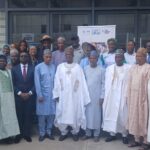Pate inspects health facilities for Hajj 2025
2025-03-24
Prof. Muhammad Pate, Coordinating Minister of Health and Social Welfare, has completed a ministerial inspection of the National Hajj Commission of Nigeria’s (NAHCON) medical facilities in Makkah, Saudi Arabia. Muhammad Musa, Head of Public Affairs, NAHCON, disclosed this in a statement in Abuja. Musa said that the visit signalsContinue Reading












